© europa.eu

Short of leading the entire population into a giant mixing machine run by demons, or accidentally setting off a thermo-nuclear device, it’s hard to imagine how the European Commission could have made a bigger mess of the COVID-19 vaccination programme. It would almost be funny, if it wasn’t so tragic. Just when nationalist sentiments are threatening to tear the European Union apart, the European Commission announces a whole series of ill-thought-out ideas that could hardly have been better designed to encourage others to think in a similar way.
Jacques Delors must be weeping with frustration at the way the Commission over which he presided so successfully from 1985 to 1995 has mishandled the pandemic and the untidy way in which it has sought to vaccinate its citizens. Not only that, but it seems to have decided to prevent anyone not in the EU from getting a dose of the vaccine. This must be an absolute gift to the anti-EU campaigners of the UK (the government, for instance) whose own vaccination programme has been so successful.
Meanwhile, the member states have fallen to squabbling over who gets what. The Austrian Chancellor, Sebastian Kurz, for instance, has threatened to stop the Union from buying any extra doses of the Pfizer vaccine unless his country gets a bigger share of them, and has begun negotiations with Russia to buy their vaccine.

Certainly, the so-called Sputnik V vaccine seems to have cleared any regulatory hurdles. The covid-19 vaccine developed by the Gamaleya Research Institute, part of the Russian Ministry of Health, has an efficacy of 91.6%, according to interim results from a phase 3 trial. According to the UK’s publication for doctors, the highly-respected British Medical Journal (BMJ), “The Gam-COVID-Vac, also known as Sputnik V, was tested at 25 hospitals and polyclinics in Moscow between 7 September and 24 November 2020. Just under 15,000 volunteers received the vaccine (of whom 1,611 were aged 60 or over) and 4,902 received the placebo (vaccine buffer composition).” So Austria should be OK there, even if the EU isn’t.
But while Britain has emerged as the most successful in vaccination terms, which Brexit fans say is due to them being outside the EU, the UK faces the problem of its self-imposed isolation and the difficulty of having to rely on overseas production of more doses. Importing anything into Britain now is a bureaucratic nightmare, leaving both exporters and importers drowning in a sea of multi-lingual paper no-one has needed for more than 40 years. That’s why the UK has decided to produce the American Novavax NVX-CoV2373 Vaccine at a factory in the UK. It is said to be 83% effective, even against the highly-contagious UK variant. As the company says on its website: “Our vaccine candidates are genetically engineered using three-dimensional nanostructures of recombinant proteins critical to disease pathogenesis.”

All the vaccines in circulation are different in one way or another. I had the Pfizer-BioNTech vaccine (British recipients were not given a choice), which seems to have proved less controversial than the AstraZeneca/Oxford vaccine.

In another sign of panicky decision making, the Commission even suspended use of the AstraZeneca vaccine out of a fear that it caused blood clots. It’s still unclear if the vaccine causes the clots, but in Britain, seven people died of blood clots following vaccination, although no-one knows if that’s cause and effect or coincidence. At the time of writing, eleven people have been reported to have developed blood clots out of the 30-million vaccinated. That’s a risk percentage of 0.00003666666 recurring. The Medicines and Healthcare Products Regulatory Agency (MHPRA), The World Health Organization (WHO) and the European Medicines Agency (EMA) have said that the benefits outweigh the dangers. However, Germany suspended use of the AstraZeneca vaccine for people under 60. Different countries have imposed different rules but overall some dozen European countries introduced bans or restrictions, despite official EMA advice.
MANY PATHS, NO MAP
The European Union and its member states are rich, resourceful, scientifically advanced and blessed with generally good health care systems. How can that suave togetherness have been shattered by something that is only 60 to 200 nanometres in diameter? After all, a human hair is A human hair is around 75,000 nanometres (nm) in diameter. Could it be that the EU is still jittery over other factors, not least the world economy and the frightening cost of the COVID-19 virus pandemic? With nobody certain which way to jump and with some countries talking about leaving the Union anyway and following the UK out into the friendless wilderness, perhaps leaders less inclined to leave are tending towards being over-cautious. They shouldn’t be, because the nationalist politicians have been toning down their anti-EU rhetoric during the pandemic.
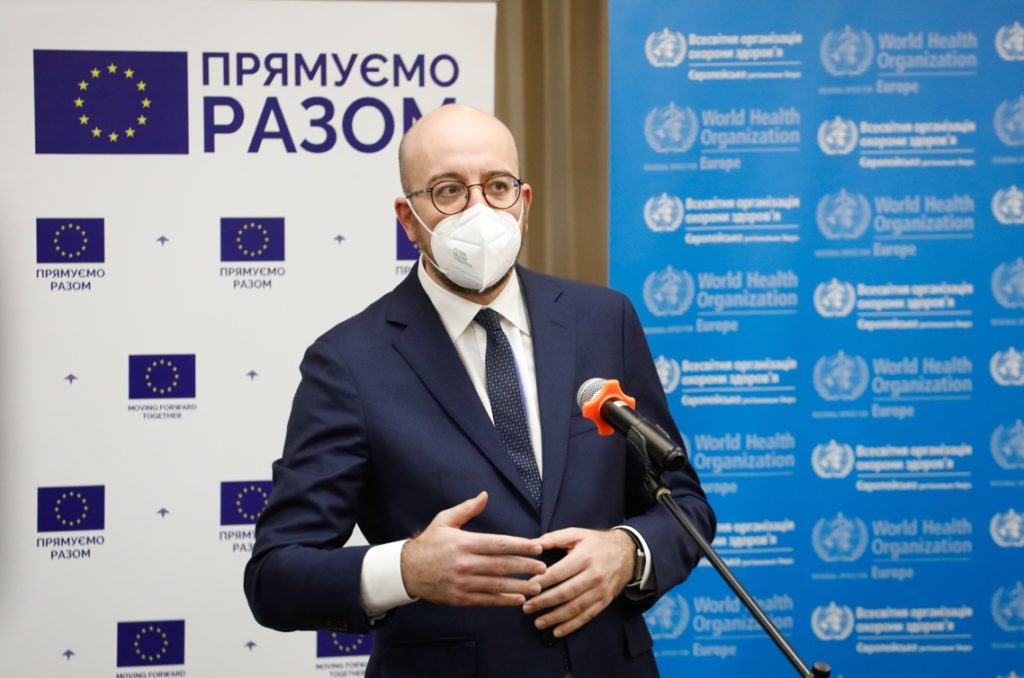
The SARS-CoV-2 virus, of course , is in no way hesitant. As soon as it enters the human lung, it latches onto an angiotensin-converting enzyme 2 (ACE2) receptor, at which point a protease enzyme cuts off the spike of the virus – it is surrounded by such spikes, which is what makes it look like a sea mine – and this releases the fusion machinery, which is somewhat spring-loaded within the spike. The virus and lung cell membranes then fuse so that the RNA of the virus can pour into the cell. Inside, it presents round about two dozen genes to the ribosomes of the cell, which are what translates genes into proteins. Some of these create protective vesicles. Using its own polymerase copying machinery, the virus starts making copies of itself which break out of the host cell and spread. One cell can produce hundreds of copies before it dies, its resources exhausted. Some viruses go to infect other cells, some – many – are exhaled. That’s why masks are so important. The virus, of course , has no brain but it seems to be surprisingly clever at evading the body’s natural defences and some of the vaccines.

Vaccines do work, however, and it’s worth noting that Britain’s lead in vaccinating its population doesn’t mean it leads in defeating the virus. As The Economist puts it in a leader column: “In the brutal and blunt league table of fatalities, the EU as a whole has done less badly than Britain or America, with 138 recorded deaths per 100,000, compared with 187 (UK) and (US) 166 respectively – although Hungary, the Czech Republic and Belgium have all fared worse than either.” It’s worth remembering that, successful vaccine roll-out notwithstanding, the UK has one of the worst death rates from COVID-19 in the world. A new and especially deadly variant that has emerged may, however, change all that. The Economist reports that 58% of British adults have now had the vaccine (at the time of writing), compared with 38% of Americans and just 14% of EU citizens. That poor result for the wealthy EU is widely seen as shameful. One of the architects of the European Coal and Steel Community, forerunner of the EU, was Jean Monnet, who once wrote that “Europe will be forged in a crisis”, meaning that it would come together more effectively when faced with an external threat. The idea has worked sometimes but certainly not always and clearly not at all over COVID-19. In this case, the member states have reacted more like the proverbial headless chicken, closing their borders, blocking the export of protective equipment and generally displaying no sensible policies at all.
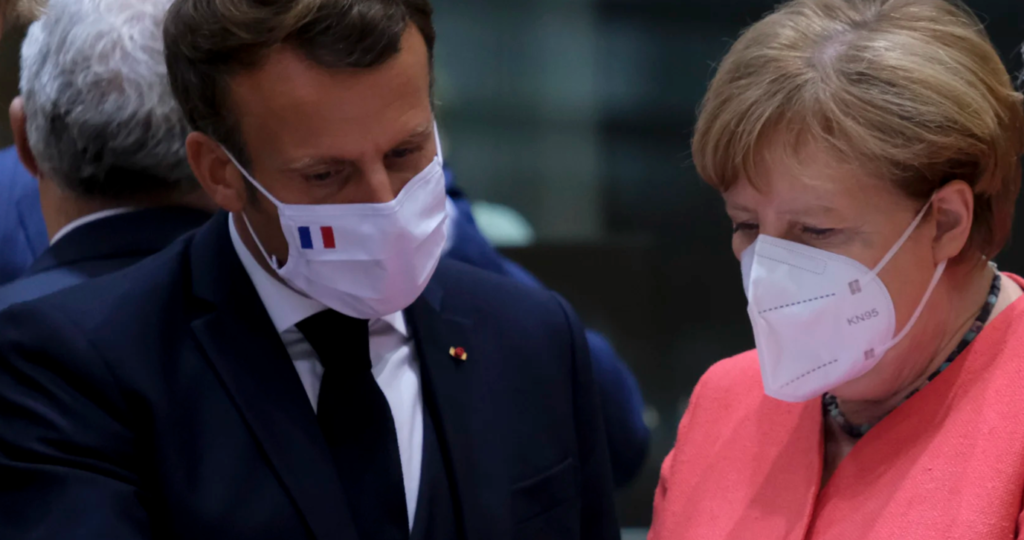
It’s really down to the ‘communitaire’ instincts of Germany’s Angela Merkel and French President Emmanuel Macron that the EU has held together, with the European Commission given responsibility for acquiring and distributing sufficient vaccine doses to meet the needs of a population not far short of half a billion. The Commission got it seriously and surprisingly wrong.
Vaccine hesitancy, a major issue in the United States, is also a problem in some EU member states. For instance, the Roma community often mistrust vaccines, largely because they fear their community could be used to test drugs. The Roma are Europe’s largest ethnic minority, numbering up to 12-million. Living mainly in southern and eastern Europe, they are disadvantaged in many ways, living in slum-like conditions lacking proper drainage and hygiene. I have been inside several Roma dwellings, some kept immaculately, despite the surroundings and lack of facilities, but some are virtually death-traps.
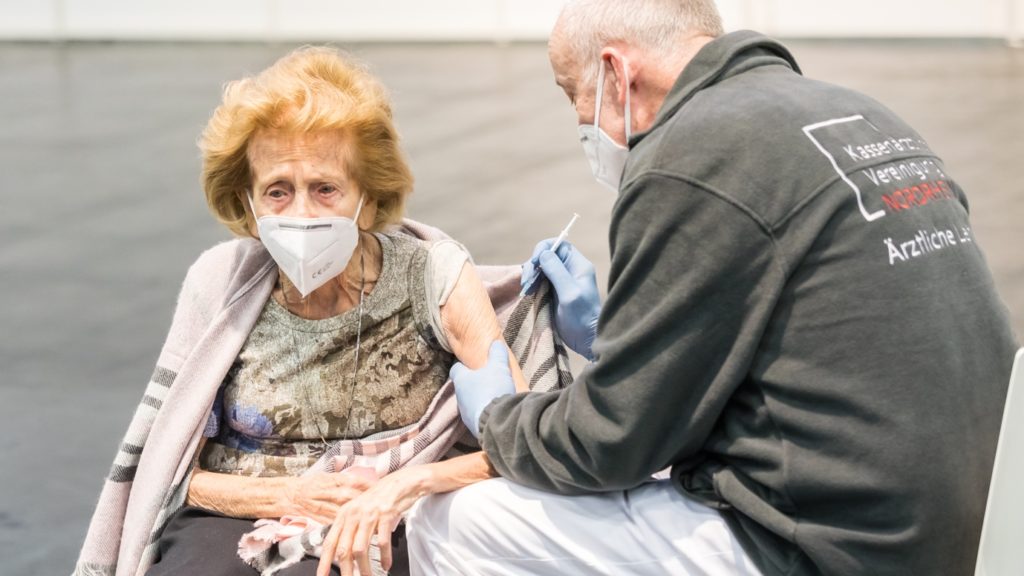
As this report by Oxford University’s European Journal of Public Health shows: “Many live in settlements remote from health facilities, health professionals often actively discriminate against them, interactions with health workers are frequently characterised by mutual mistrust and they are frequently excluded from health insurance schemes or have low enrolment rates, frequently lower than with their non-Roma compatriots. Factors that contribute to these health disparities include lack of documentation to establish citizenship, other entitlement to register for health insurance, expensive premiums with lower coverage and fragmented or poorly implemented health insurance schemes.” I have spent time with Roma communities and have seen them being refused medical help, turned away by doctors with a sneer, mainly because they cannot afford to pay for it. It’s easy to understand their mistrust and hesitancy, even if a vaccine is available close to where they live. In any case, it’s a contributary factor to the EU’s vaccine failure.
THE SPECTRE OF WALL STREET
The vaccine problems were made worse by an unseemly row between the EU and the UK over vaccine availability. At one point the UK government was angered by reports that police raiding an Italian warehouse had uncovered 30-million doses of the AstraZeneca vaccine allegedly labelled as bound for the UK. The company denied it, insisting they were bound either for developing countries or for the EU’s own storerooms. There was even the suggestion that it was an attempt to cause public outage against AstraZeneca.

The UK was accused by the EU’s Internal Market Commissioner, Thierry Breton, of “vaccine nationalism”. The UK’s Health Secretary, Matt Hancock dismissed it as a row over contract law, insisting the UK’s contracts were better. However, Prime Minister Boris Johnson angered his backbenchers by proudly announcing that Britain’s success at delivering the vaccines was down to “good old-fashioned greed”: in other words, it was all due to profit-seeking capitalists.
Even his supporters were not happy and showed their displeasure. It had been a little too close to the quote by Gordon Gekko, played by Michael Douglas in the 1987 film, Wall Street, when he said “Greed, for want of a better word, is good”. “Greed is good” became s popular catchphrase at the time; everyone forgot to include “for want of a better word”.
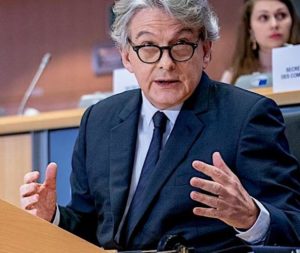
Johnson withdrew the remarks but they had already showed where his allegiances lay and raised fears yet again that he would like to dismantle the National Health Service, legacy of Clement Attlee’s post-war government, in favour of a privatised ‘for-profit’ system, which some of his supporters have professed to prefer.
Even so, the crisis has caused raised eyebrows, even among those who fought to keep Britain in the EU, such as Labour peer Andrew Adonis. He said: “The vaccine crisis shows an alarming power vacuum & absence of leadership in Europe.” Ursula von der Leyen, usually slick and confident at press conferences, now seems indecisive and weak.
Her predecessor, Jean-Claude Juncker, it’s been claimed, would have handled it better.

It’s easy to forget that the EU has actually vaccinated a lot more people than Britain: around 70-million at the time of writing. It’s just that the population of the entire EU is much larger than the UK’s. Why has it gone wrong for the EU? There’s no clear answer but it looks as if a fondness for grandstanding outweighed the urge for concerted and well-considered action.
It’s not the first time with the current Commission. Emmanuel Macron told a Greek TV programme that Europe had “lacked ambition”. Concentrating more on Europe’s economic woes than on the pandemic. Progress was also hampered, he noted, by the fact that health is not an EU competence. It’s the responsibility of local and national agencies.
It only gradually became clear that buying up vaccines in such enormous quantities could not be left to member state governments; the European Commission would have to step in. And with a rather too delicate and hesitant step, it did, eventually. It had already been shown that the big countries were buying up vaccines, leaving their smaller neighbours behind. But the EU is supposed to be a union: equal shares for all. That was what inspired Jean Monnet and Robert Schuman to create the High Authority, after Schuman’s speech on the 9 May 1950, placing all of France’s and Germany’s coal and steel production under the control of a single organisation.


It was the level of vision needed for the vaccine roil-out but it was sadly missing, or at least nothing like as vigorous. The flame may not have gone out but it’s hardly more than a barely glowing ember these days.
Pause for a moment to consider how the vaccines actually work. The Oxford/AstraZeneca vaccine uses an unrelated harmless virus, modified to deliver SARS-CoV-2 genetic material in a special delivery virus, known as a viral vector.
The cells in our bodies use this genetic material to make a specific SARS-CoV-2 protein which is recognised by our immune system, triggering a response which builds immune memory, encouraging our bodies to fight SARS-CoV-2 if it meets it in future.
The Pfizer/BioNTech and Moderna vaccines work in a slightly different way (although it may take a virologist to explain exactly what the difference is or does). The vaccine contains a segment of real SARS-CoV-2 genetic material that codes for a particular protein, which can be either RNA or DNA.
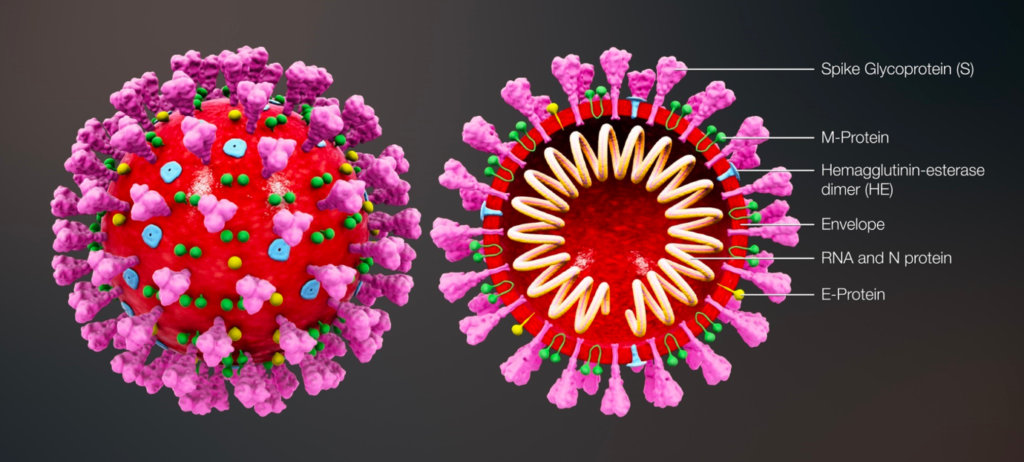
The cells in our bodies use the genetic material to make the full SARS-CoV-2 protein, which is immediately recognised by our immune systems to set off a response. That response builds immune memory so that our bodies can fight off a SARS-CoV-2 virus the next time it meets one. There are other types undergoing clinical trials. Two of them, for instance – Sinovac and Sinopharm – use SARS-CoV-2 viruses that have been killed. (Maybe ‘killed’ is not the right word, since many biologists do not believe a virus to be ‘alive’ in the first place). Our immune system recognises the ‘corpse’ of the virus and triggers a response without causing illness, not only fighting off any future incursions but building memory for other occasions. Such a method is already being used in the influenza vaccine. In the case of Codagenix, also undergoing trials, a weakened SARS-CoV-2 virus is used, which is recognised by the immune system, triggering a response without causing illness. This type is already in use in the Oral Polio vaccine, for instance. Other varieties, such as Novavax and Sanofi/GSX, contain proteins from the SARS-CoV-2 virus, which can be whole proteins or fragments, packed into nanoparticles to build up your body’s memory so that it can fight off the real thing. It’s the system used in the current Hepatitus B vaccine. When it comes to getting vaccinated, however, we’re seldom offered a choice: I received the Pfizer vaccine, my wife got the AstraZeneca and suffered side-effects. She says she’s pleased that she was vaccinated at all. I like to think the medical staff administering both doses were just doing their jobs and. not motivated purely by greed. The pandemic has been worse in countries whose leaders are convinced by their political leanings not to believe in COVID-19 or the need for precautions.
DEATH DEFYING THE EASY AND PLEASANT WAY
On their website, McKinsey and Partners points out the problem of facing a completely unexpected crisis: “Once leaders recognize a crisis as such, they can begin to mount a response. But they cannot respond as they would in a routine emergency, by following plans that had been drawn up in advance. During a crisis, which is ruled by unfamiliarity and uncertainty, effective responses are largely improvised.” Clearly that is true. Take the case of Turkey, for instance. The British Medical Journal writes that: “Doctors in Turkey who post information about local covid-19 cases on social media are facing harassment and criminal charges from authorities anxious to hide the extent of the pandemic’s spread in the country, the Turkish Medical Association has said.” Dealing with any health emergency becomes many times more difficult if the government is determined to hide the truth and harass those trying to help people.
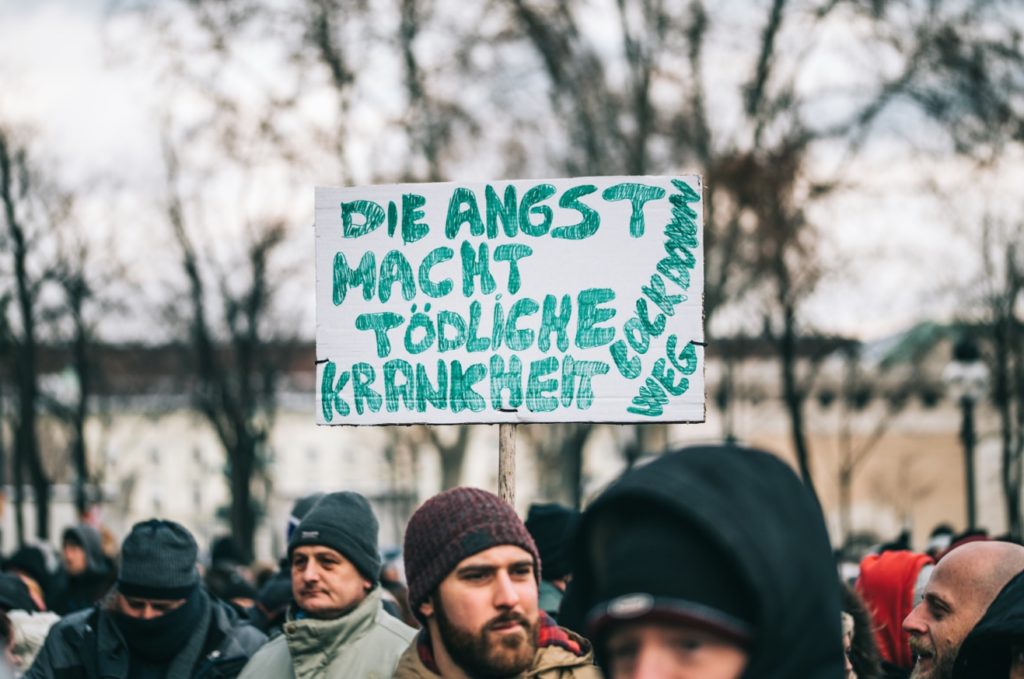

Disbelief in the pandemic seems to be linked to far-right, far-left and dangerously militant groups. One example is cited by the .coda website: “In Austria one anti-lockdown campaigner and several of his supporters were recently arrested with a collection of handguns and revolvers, 34 bottles of LSD, 5kg of cannabis and a sword.” Even in the well-vaccinated UK, the BMJ mentions problems: “Our national pandemic health protection response in the UK has been undermined at every turn by misinformation and disinformation from self-styled ‘libertarians,’ ‘lockdown sceptics,’ ‘truth seekers,’ covid deniers, conspiracy theorists, and professional attention seekers—whether high-profile media commentators, politicians, and lobbyists, or organised groups on social media.” Many of those involved are familiar from protests about other things they dislike.
The British Medical Journal correctly labels them ‘attention-seekers’ anyway, political or otherwise: “’More than a few politicians and millions of citizens still don’t believe [the coronavirus pandemic] is happening,’ University of Sydney politics professor John Keane wrote recently. ‘Dogged in their stupidity, thinking only of themselves, they are sure that it’s all a hoax, or a media-hyped exaggeration whose falsity will soon be exposed.’” To which most experts would retort “if only”. Meanwhile, though, the COVID-deniers, many of whom are also anti-vaxxers, see scientific experts as ‘the elite’ from which they themselves are excluded (by their lack of knowledge) and blame them for interfering in their lives.
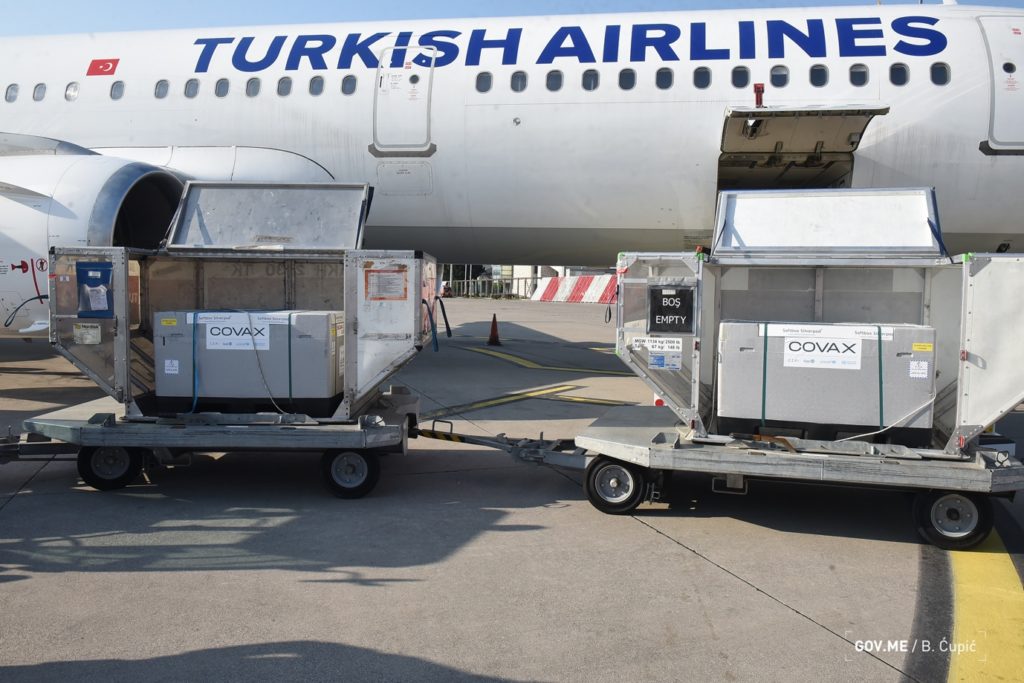
On 28 March 2021, Montenegro received a first batch of 24,000 doses of the COVID-19 vaccine through the COVAX mechanism. COVAX is the vaccines pillar of the Access to COVID-19 Tools (ACT) Accelerator, a global collaboration to accelerate the development, production, and equitable access to COVID-19 tests, treatments, and vaccines.
All over Europe, groups have gathered, ignoring social distancing and refusing to wear masks to demonstrate their belief that COVID-19 is a hoax. “Daniel Jolley, a senior lecturer in psychology at Northumbria University and an expert in conspiracy theories,” reports the New York Times, “said the emergence of a growing, vocal contingent of people who believed governments were not being truthful about the pandemic was unsurprising.
‘People are drawn to conspiracy theories in times of crisis,’ Mr. Jolley said. ‘When there is something happening — a virus outbreak, rapid political change, the death of a celebrity, a terrorist attack — it breeds conspiracy theories.’ The prolonged nature of the pandemic and the prospect of a new round of government restrictions, he believes, have only deepened that distrust and potentially spurred on the naysayers.” Basically the protesters are saying that they don’t like wearing masks (who does?), they don’t want to face lockdown (who would?) and that therefore the SARS-CoV-2 virus must be a hoax (it certainly isn’t). It doesn’t exist simply because they don’t like it, in other words.

And yet, as the Statista website declares: “As of March 31, 2021, there were almost 129 million global cases of COVID-19. Around 104 million people had recovered from the disease, while there had been 2.8-million deaths. The United States, India, and Brazil have been among the countries hardest hit by the pandemic.” That, at least, is not something that can laid at the door of Commission President Ursula von der Leyen.
Nor, presumably, can the scandal gripping Paris. A report on the privately-owned TV channel M6 showed diners feasting luxuriously in very posh restaurants in breach of France’s strict lockdown laws. It is a secret luxury only for the super-rich (and super-stupid, we must assume). The lockdown is supposed to mean that all restaurants are closed but the one shown in the report was not. The TV station Tweeted the secretly-shot pictures while mentioning “caviar, champagne, the menus of top chefs and no masks allowed”. On the day the story broke, the number of COVID-19 patients in intensive care in France had risen to 5,431. Paris Prosecutor Remy Heitz told the Irish TV channel Raidió Teilifís Éireann (RTÉ) that he was launching a criminal probe into the restaurant and the allegations that its wealthy patrons on that occasion had included a few government ministers. Whether they were or not, he wants to know who they were so that he can prosecute them. The Tweet that first exposed the scandal had the tag #OnVeutLesNoms (we want the names) to encourage people to expose the guilty.
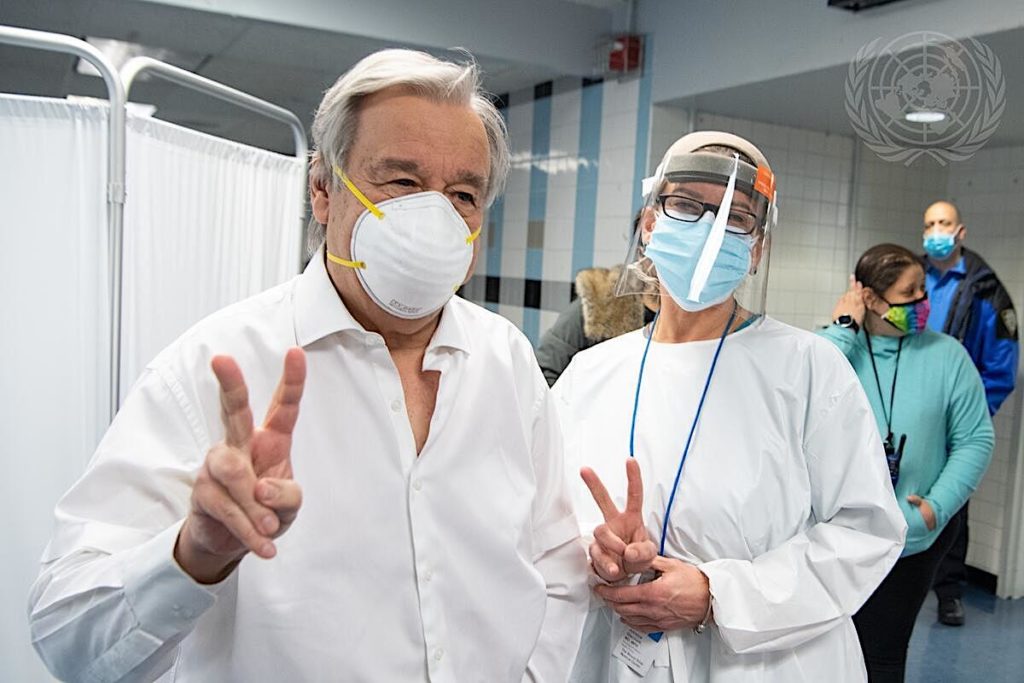
Things are also bad in Italy, with a daily death rate of around 300. In total, 111,326 people in Italy have died from the pandemic. In Poland, around 40,000 cases were confirmed in each of the two weeks leading up to Easter, part of a surge of cases all across Central and Eastern Europe. Further afield, the SARS-CoV-2 virus is still spreading, with the highest number of deaths being recorded in the United States, closely followed by Brazil, Mexico, India, the UK, Italy, Russia, France, Germany and Spain. You might imagine that this knowledge that we’re all in it together might bring a sense of harmony and mutual aid. Of course, it doesn’t. In Italy’s case, it looks as if there have been aggravating factors. By far the worst effect has been in Lombardy, a heavily industrialized region and Italy’s most intensely populated. Research conducted by Science Direct suggests that Lombardy’s severe air pollution, among the worst in Europe, may have played a rôle because of the victims’ long-term exposure to particulate matter (PM) and nitrogen dioxide (NO2). The researchers took data from 1,439 municipalities out of 1,507, in which a total of 61,377 COVID-19 cases were recorded, plus 40,401 deaths. Science Direct reported that exposure to PM was “significantly associated with the COVID-19 incidence and excess mortality during the first wave of the outbreak in Lombardy.” Then there’s Hungary, with a daily death rate in excess of 300, despite a seemingly successful vaccination programme, which included the Sinopharm vaccine from China and Russia’s Sputnik V.

It’s hard to know for sure, however: journalists are barred from entering hospitals and medical facilities. Hungary’s autocratic Prime Minister, Viktor Orbán, is also highly secretive. Hungary seems to get some things right but then implements them inefficiently. Take ventilators, for instance. Hungary bought no fewer than 16,000 of them last summer, but lacks the staff to operate them. According to the BBC, it has a 25% shortage of doctors and a 35% shortage of nurses because they have chosen to emigrate to a country with a different kind of government. Additionally, some 5,000 doctors resigned last month in a row over reforms to their remuneration package.
WORKING WITH THE VIRUS
Further afield, Brazil is clearly a special case. An especially bad case, that is. “More than 3,780 COVID-19 deaths were recorded on 30 March,” writes the BMJ, “six days after the country recorded its 300,000th life lost to the illness. At least 60,000 Brazilians died with COVID-19 in March as the more transmissible variant known as P.1 spread across the country.” Much of this has been blamed on the COVID scepticism of far-right President Jair Bolsonaro. “A flurry of high-profile resignations—including the foreign and defence ministers and the heads of the army, navy, and air force—have added to the woes of President Jair Bolsonaro,” reports the BMJ. “Critics hold Bolsonaro responsible for the country’s sobering covid-19 death tally, as he has played down the threat of the virus and refused to implement stricter measures to slow its spread.” Bolsonaro is opposed to lockdowns – indeed, opposed to doing anything at all about the pandemic – and has threatened to use the military against any regions that impose their own lockdowns. The armed forces, though, seem to be losing patience with him and a few days before the resignations, they had signed a manifesto demanding effective government action to control the worsening second wave of the pandemic that is now threatening Brazil’s economy with implosion.
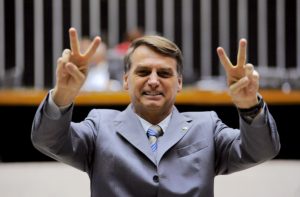
Bolsonaro has throughout the pandemic dismissed COVID-19 as “a little ‘flu” and advised Brazilians to “take it like a man”. Vaccinations are now happening; by late March, just over 7% of the population had received a first dose. Obviously, far more Brazilians would now have been vaccinated, but for Bolsonaro. No wonder he is said to be ‘increasingly isolated’.
One effect of the pandemic has been the change in who is working and who is not. Many people have, of course, lost their jobs, especially those unable to work from home. But you may not be surprised to learn that it has disproportionately affected women. Women are more likely to hold low-wage jobs and those have been among the first to go. On top of that, with school closures there has been the need to find affordable childcare. In an excellent but worrying report on the website of the accountancy giant Deloitte, it says: “Women, who have traditionally taken on primary caregiving duties, have been especially hard hit, with added daily responsibilities and a host of new challenges to their work/life arrangements. Our survey of nearly 400 working women across nine countries, at a variety of career levels of seniority and spanning various industries, reveals the pandemic is affecting their daily routines, physical and mental health, and careers. The survey unveils the pandemic’s impact on the work/life balance and well-being of countless working women, highlighting how the pandemic could threaten some of the progress made on gender equality in the workplace in recent years….Nearly 70% of women who have experienced these disruptions are concerned their career growth may be limited.” The report was based on a survey carried out by Deloitte, which discovered that: “65% now have more responsibility for household chores. One third said their workloads have increased due to the pandemic. 58% of those with children reported added childcare responsibilities. 53% of those with children reported that they have increased home-schooling/education responsibilities”.
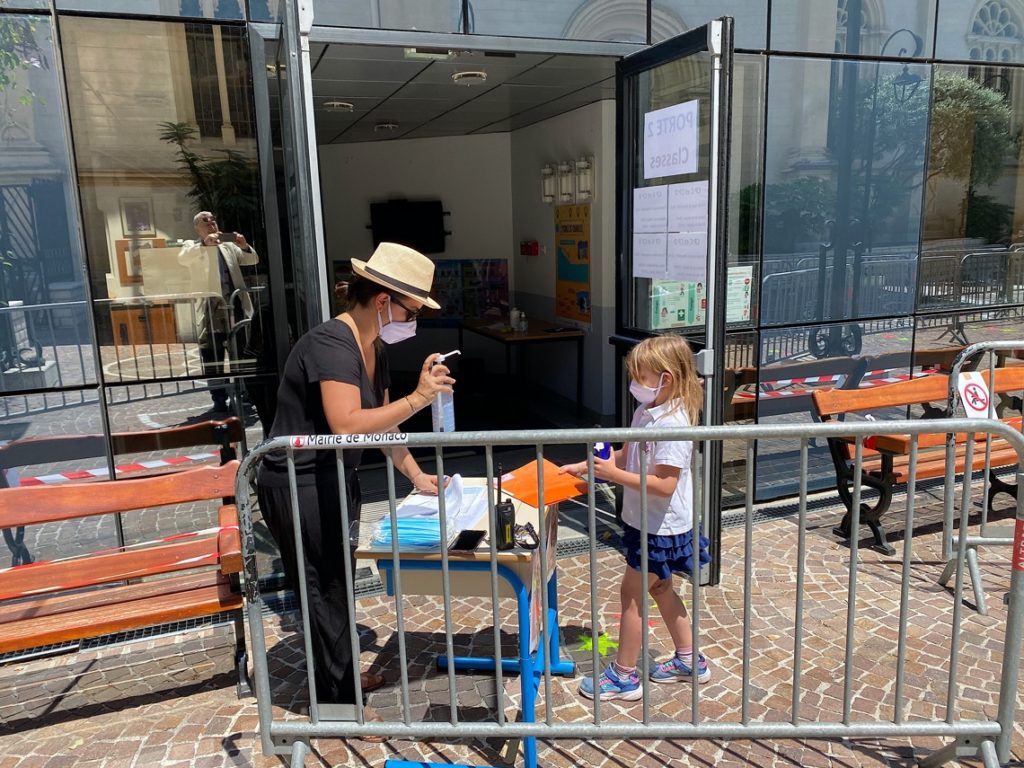
Just when you hope countries of the world – or parts of it – are starting to get things right, along comes the SARS-CoV-2 virus to mess it all up again. Africa has reported 4,186,456 cases, mostly in South Africa, Morocco, Tunisia, Ethiopia and Egypt. Asia has had 24,072,463 cases, mostly from India, Iran, Indonesia, Iraq and Israel. The Americas, North and South together, have suffered 56,084,701 cases, led by the United States and Brazil. Europe has had 43,220,869 cases, with the highest numbers in France, Russia, the UK, Italy and Spain. Things have been better in Oceania: only 63,734 cases, majority in Australia. Tropical islands have come off best, especially Vanuatu, Samoa, Wallis and Futuna, the Marshall Islands and Anguila. The Western Sahara hasn’t done badly either: 10 cases overall and only one death.
The problem is that as soon as someone seems to have got on top of the COVID-19 virus a new variant evolves that either spreads more easily and quickly or proves to be more deadly. Sometimes both. British authorities say they’re most worried about a South African variant, which is currently accounting for up to 10% of the infections in European countries. The most dominant strain, however, is one first discovered in Kent, in the south-east of England, from where it has now spread to 27 European countries, according to the World Health Organisation (WHO), including Denmark, Italy, Ireland, Germany, France, the Netherlands, Spain and Portugal. However, there is concern that the South African variant may be more resistant to any vaccine tested so far. Count Galeazzo Ciano, an Italian Fascist politician, wrote in his diary in 1946: “Victory has a hundred fathers, but defeat is an orphan”, meaning everyone wants to claim their part in a success, but deny their share of blame for failure. If today’s scientists fail to get to grips with SARS-CoV-2 and our politicians fail to act sensibly in gaining control of it, then there may be many orphans and too few victors.

